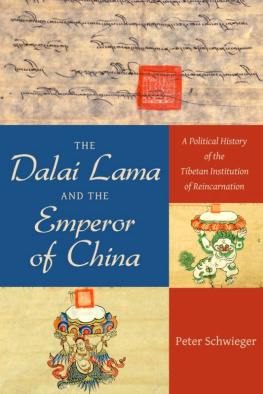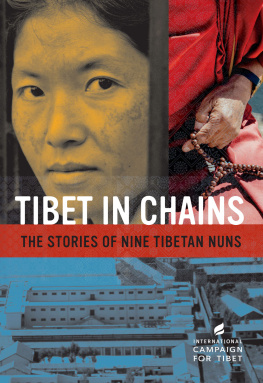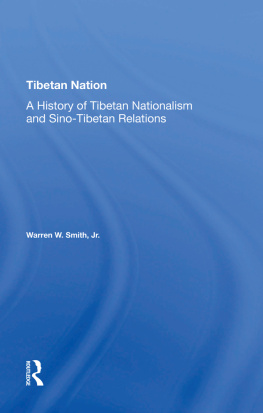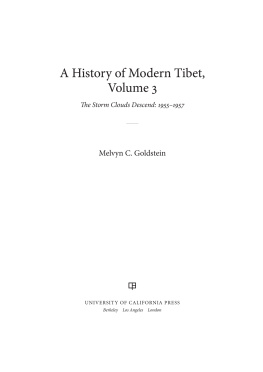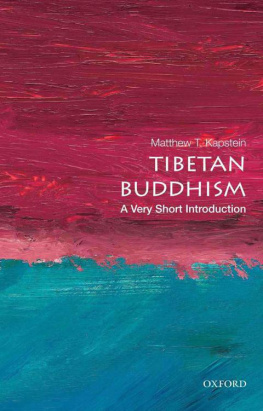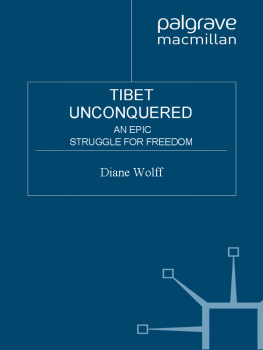THE DALAI LAMA AND THE EMPEROR OF CHINA
THE DALAI LAMA AND THE EMPEROR OF CHINA
A Political History of the Tibetan Institution of Reincarnation
Peter Schwieger
COLUMBIA UNIVERSITY PRESS
NEW YORK
A special thank you to the Shelley & Donald Rubin Foundation for crucial financial support toward the publication of this book.

Columbia University Press
Publishers Since 1893
New York Chichester, West Sussex
cup.columbia.edu
Copyright 2015 Columbia University Press
All rights reserved
All maps created with stepmap.de
Library of Congress Cataloging-in-Publication Data
Schwieger, Peter, author.
The Dalai Lama and the Emperor of China : a political history of the Tibetan institution of reincarnation / Peter Schwieger.
pages cm
Includes bibliographical references and index.
ISBN 978-0-231-16852-6 (cloth : alk. paper) ISBN 978-0-231-53860-2 (electronic)
1. Tibet Autonomous Region (China)Politics and government. 2. ReincarnationPolitical aspectsTibet RegionHistory. I. Title.
DS786.S36 2014
951.503dc23
2014020432
A Columbia University Press E-book.
CUP would be pleased to hear about your reading experience with this e-book at .
Jacket design: Jordan Wannemacher
Jacket images: (top): Document issued by amban Wenbi and assistant amban Yangchun (1810). (right and bottom): Details of a document issued by the Thirteenth Dalai Lama (1902)
References to websites (URLs) were accurate at the time of writing. Neither the author nor Columbia University Press is responsible for URLs that may have expired or changed since the manuscript was prepared.
CONTENTS
TO WRITE A book about Tibets early modern political history is a sensitive endeavor, since the issue will inevitably be perceived against the backdrop of the current worldwide political debate on the Tibet Question. While sincerely hoping that the book will add some solid ground to this discussion, I have tried my best not to engage in the politics of history. I was driven by two major motives. The first was to contribute to a better understanding of Tibets past and present by focusing on an aspect of Tibets political history that, although it has always been regarded as a crucial matter, has never been studied in its historical depth or within the context of Inner Asian history. Unique to Tibetan culture and societies, the Tibetan institution of reincarnation created and justified distinct patterns of social and political interaction, not only within Tibet itself but also in relation to its mighty neighbors. The second motive was to direct more attention to the general importance of archival material as a first-class source of Tibets history. The intention when translating a great deal of this material into English was twofold: not only to convey something of the style and elegance of Tibetan legal documents but also to let them play their part in the narratives themselves. For this reason, I have allowed them their originality as much as possible and avoided reducing them to compliant elements in the plot of my own narrative. Nevertheless, this book still wants to tell a story, a story that is readable and based on plausible argumentation. Whether I have succeeded in performing such an acrobatic feat I leave to the judgment of each and every reader.
The foundation for writing such a book was laid a long time ago when my academic teacher, Dieter Schuh, first introduced me to the world of Tibetan diplomatics. It was at that time that my interest in Tibets legal and social documents was born. Later, between 1998 and 2000, I had the opportunity to conduct a joint project with the Archives of the Tibetan Autonomous Region (TAR) in Lhasa for digitalizing legal documents. During this project, I became aware of the enormous amount of professional literature that had been produced by Tibetan administrations. The archival material itself is what ultimately gave me the greatest inspiration for writing this book. Although at first they appeared cumbrous and recalcitrant, the documents slowly began telling a story of their own as I became more and more familiar with their specific paleography, orthography, phraseology, and terminology. The actual work on the book began during a sabbatical I took in 2011, which allowed me the freedom to concentrate on the work.
Thanks to the support of the Agence nationale de la recherche (ANR) and the Deutsche Forschungsgemeinschaft (DFG), Charles Ramble from the cole pratique des hautes tudes in Paris and I succeeded in setting up a joint project on A Social History of Tibetan Societies from the Seventeenth to the Twentieth Century. This enabled me to embed my research in a broader context and to motivate a discussion forum involving quite a number of dedicated colleagues. These colleagues were a driving force encouraging me to finish my book. After reading the first version of the manuscript, Charles Ramble encouraged me to look for a publisher that would present the book to a broader readership than those engaged in Tibetan studies only.
I am especially grateful to Borjigidai Oyunbilig. It was a great pleasure having him as a colleague for Mongolian studies for one year in Bonn, and his expertise on Mongol and Manchu history of the seventeenth and eighteenth centuries opened my eyes to the big Inner Asian picture. I also want to thank Elliot Sperling for sending me his recent articles even before they left the printer, and Fabienne Jagou for generously providing certain articles that were difficult for me to obtain. I am much obliged to Yvonne Marchand, who carefully and as far as possible freed my English from its clumsiness and converted my writing style into a more natural one. I am also indebted to Syrhoi Sou for preparing the index. In both regards, I thank the Deutsche Forschungsgemeinschaft (DFG) for their financial support. I owe a special debt of gratitude to my family for putting up with a husband and a father who from time to time turned into a monomaniac. Finally, I wish to thank Leslie Kriesel for the cautious editing of the manuscript as well as Anne Routon and Whitney Johnson of Columbia University Press for their diligence in dealing with the difficult manuscript and the pleasant and smooth communication across the ocean.
In my efforts to create a book that is also comprehensible to those not engaged in Tibetan studies, I decided to refrain from presenting the Tibetan names pursuant to the well-established scientific transliteration systems and instead to follow the simplified phonetic transcription introduced and promoted by David Germano and Nicolas Tournadre (http://www.thlib.org/reference/transliteration/#!essay=/thl/phonetics/). A list at the end of the book provides the spelling equivalents according to the Wylie transliteration scheme. It is only in the notes that the Wylie scheme is occasionally applied when discussing or explaining specific philological problems of the sources.
Peter Schwieger
Bonn, January 2014
ONE OF THE most striking features of all Tibetan societies right up to the present day is the social position of reincarnated enlightened persons, regarded as emanations of transcendent divinities. In Tibetan they are called trlkus, a term referring to specific Buddhist concepts and ideals that were already present in Mahyna Buddhism in India. But as a social position, the trlku is a genuine Tibetan development. It comprises religious, economic, legal, and political functions, all of which accrued during the course of Tibetan history. Apart from a very few notable exceptions, trlkus always were and still are males. The most popular are the successions of the Dalai Lamas, the Panchen Lamas, and the Karmapas.
Next page
